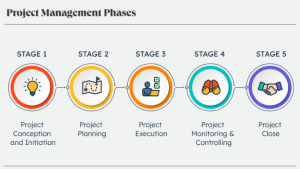Project Management and Types of Project Management
Project Management and Types of Project Management
Project management is the art and science of planning, organizing, executing, and controlling projects to achieve specific goals and objectives. Project management is a vital skill for business administration, as it involves managing various aspects of businesses, such as entrepreneurship, innovation, strategy, marketing, finance, and operations.
However, project management is not a one-size-fits-all discipline. Different types of project management can be applied to different situations and purposes. In this blog post, we will discuss the following types of project management:
- Types of project management based on the product or outcome of the project
- Types of project management based on the industry or domain of the project
- Types of project management based on the approach or methodology of the project

Types of Project Management Based on the Product or Outcome of the Project
The product or outcome of the project is what the project aims to deliver or achieve. It can be a tangible or intangible result that satisfies the needs or expectations of the stakeholders. The product or outcome of the project can influence the type of project management that is suitable for the project. Some examples of types of project management based on the product or outcome of the project are:
- Communication projects: These are projects that involve creating or delivering messages or information to a specific audience or group. Communication projects can include marketing campaigns, public relations initiatives, training programs, newsletters, podcasts, etc. Communication projects require effective communication skills and tools, as well as a clear understanding of the target audience and their needs.
- Stakeholder management projects: These are projects that involve identifying, engaging, and managing the interests and expectations of various stakeholders who are involved in or affected by the project. Stakeholders can include customers, employees, suppliers, investors, regulators, competitors, etc. Stakeholder management projects require stakeholder analysis and mapping, as well as communication and negotiation skills and techniques.
- Task assignation projects: These are projects that involve assigning and coordinating tasks and responsibilities among different team members or groups. Task assignation projects can include software development projects, event planning projects, research projects, etc. Task assignation projects require task analysis and breakdown, as well as scheduling and tracking tools and methods.
- Construction projects: These are projects that involve building or renovating physical structures or facilities. Construction projects can include houses, bridges, roads, dams, airports, stadiums, etc. Construction projects require design and engineering skills and tools, as well as quality and safety standards and regulations.
- IT projects: These are projects that involve developing or implementing information technology systems or solutions. IT projects can include websites, apps, software, hardware, networks, databases, etc. IT projects require technical skills and tools, as well as user testing and feedback methods.
Types of Project Management Based on the Industry or Domain of the Project
The industry or domain of the project is the field or sector that the project belongs to or serves. It can be a broad or narrow category that defines the nature and scope of the project. The industry or domain of the project can influence the type of project management that is suitable for the project. Some examples of types of project management based on the industry or domain of the project are:
- Business projects: These are projects that involve creating or improving products or services that generate value for customers and revenue for businesses. Business projects can include launching a new product line, expanding into a new market, acquiring a new customer segment, etc. Business projects require business analysis and planning skills and tools, as well as financial and marketing strategies and techniques.
- Production projects: These are projects that involve producing or manufacturing goods or materials that meet certain specifications and standards. Production projects can include making cars, clothes, food, furniture, etc. Production projects require production planning and control skills and tools, as well as inventory and supply chain management strategies and techniques.
- Social projects: These are projects that involve addressing or solving social issues or problems that affect individuals or communities. Social projects can include providing education, health care, environmental protection, human rights, etc. Social projects require social research and evaluation skills and tools, as well as stakeholder engagement and participation strategies and techniques.
- Educational projects: These are projects that involve designing or delivering learning experiences or outcomes for learners or educators. Educational projects can include developing curricula, courses, programs, materials, etc Educational projects require educational design and assessment skills and tools, as well as pedagogical and pedagogical strategies and techniques.
- Community projects: These are projects that involve developing or enhancing the social capital or well-being of a specific community or group. Community projects can include organizing events, activities, initiatives, etc. Community projects require community development and management skills and tools, as well as collaboration and empowerment strategies and techniques.
Types of Project Management Based on the Approach or Methodology of the Project
The approach or methodology of the project is the way or manner in which the project is planned, executed, and controlled. It can be a formal or informal framework that guides the project management process and practices. The approach or methodology of the project can influence the type of project management that is suitable for the project. Some examples of types of project management based on the approach or methodology of the project are:
- Waterfall: This is a type of project management that follows a linear and sequential process that consists of distinct phases or stages, such as initiation, planning, execution, monitoring, and closure. Waterfall is often considered the traditional or classic project management approach. Waterfall is suitable for projects that have clear and fixed requirements, scope, time, and budget, as well as minimal changes or risks.
- Agile: This is a type of project management that follows an iterative and incremental process that consists of short cycles or sprints, where each sprint delivers a working product or feature. Agile is often considered a modern or alternative project management approach. Agile is suitable for projects that have vague or changing requirements, scope, time, and budget, as well as high complexity or uncertainty.
- Lean: This is a type of project management that follows a continuous improvement process that consists of identifying and eliminating waste and increasing value for customers and stakeholders. Lean is often considered an efficiency-oriented or customer-centric project management approach. Lean is suitable for projects that have high competition or demand, as well as low resources or margins.
- Hybrid: This is a type of project management that combines or integrates elements from different approaches or methodologies to create a customized or tailored solution for the project. Hybrid is often considered a flexible or adaptive project management approach. Hybrid is suitable for projects that have mixed or diverse characteristics, needs, or challenges.




